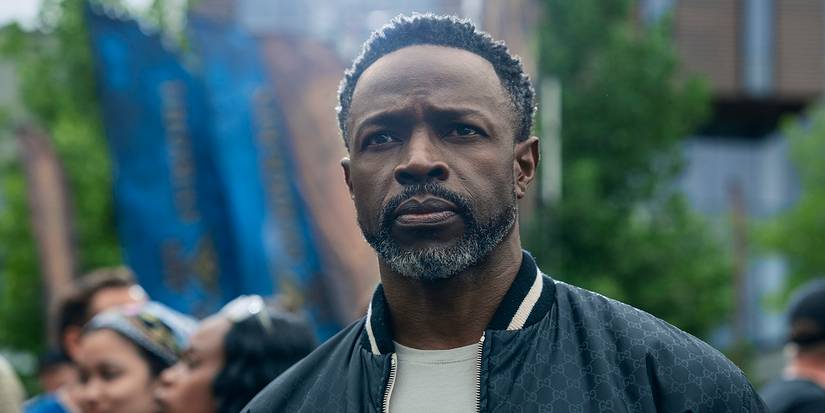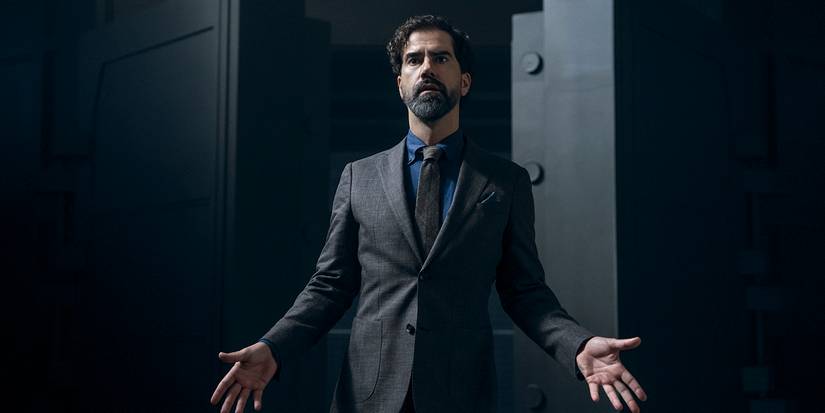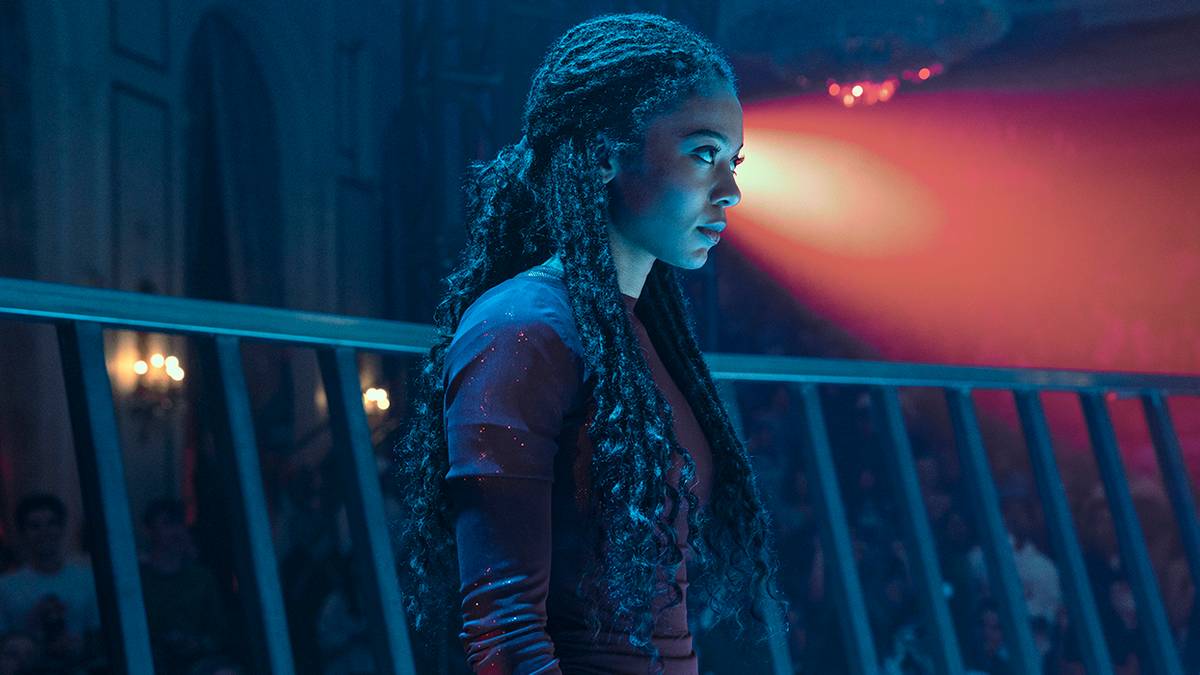Like The Boys, Gen V has never shied away from pushing a political agenda through its storylines. It’s weaved beautifully and overtly within the plot that follows young Supes studying to harness their powers to suit Vought International’s bottom line. The stakes are raised in Season 2 following the explosive Season 1 finale as well as the Season 4 finale of The Boys, the two shows interconnecting their timelines and plots seamlessly. There’s an all-out war between Supes and humans, and in Gen V Season 2, a new dean of Godolkin University is pushing that plan, calling for outright domination.
The season shape-shifts like Jordan Li from emotional to political, tense to outright gross. That’s something fans have already grown accustomed to, but the stakes are higher than ever this season. There’s a man seemingly just as dangerous as Homelander brainwashing and training the next generation to possess an “us versus them” mentality. Based on the first three episodes of Season 2 that were provided to critics for review, the show continues to be clever, savvy, witty, and gruesome — a worthy follow-up that makes us forgive the almost two-year wait.
Andre’s Gone, But the Band is Back Together

Polarity looking at someone, a crowd behind him in Gen V.
Image via Amazon Prime Video
A big question fans have had for Season 2, and a reason for the extended delay, was how the show would handle the tragic real-life death of Chance Perdomo, who played main character Andre Anderson. As creators indicated previously, the story was re-crafted, the season promising to honor him. It accomplishes this in spades, his character’s absence a huge part of the plot. Andre’s father Polarity (Sean Patrick Thomas) steps up to the plate, and Thomas does a wonderful job helping fans feel Perdomo’s presence, even though he’s not actually there.
It’s Marie Moreau, however, who takes the spotlight once again, and Jaz Sinclair does a fine job carrying the weight of the show. She’s supported by a strong group of other main cast members, both returning and new. As expected, Hamish Linklater is electrifying as Dean Cipher, the new head of Godolkin University whose primary goal is to encourage Supes to rise up against these terrifying human threats. What human threats? Typically, it’s the ones they manufacture, the dangerous Starlighters, as was the case by the end of Season 1 and in The Boys.
The main group reunites, finally out of Supe-betraying captivity, and take it upon themselves to investigate. They need to not only stop the madness and the war that Supes, led by people like Homelander and Dean Cipher, are trying to incite but also find out what was actually going on in The Woods and what the plan was for the virus that was being developed and experimented on there.
The truth runs deeper than that and involves Project Odessa, an initiative that was explored in the fourth season of The Boys when Homelander, one of the most dangerous Supes in The Boys franchise, visited the lab where he spent most of his childhood and wrought havoc. The name appears on a piece of paper on the wall, referred to only as a high security project with a warning for staff not to disclose details anywhere, including on social media. That suggests Project Odessa came long after Homelander was born, so it makes sense this concept would spill over to a show about the younger generation. What they uncover about it shakes them to their core.
Gen V Season 2 Is More of the Same, and That’s Okay
Just as Season 1 set out to do, and as The Boys has done, Gen V continues to push the envelope to see how far it can take topical social and political issues, delivering them to fans on a silver platter to feast on, and interpret, as they wish. There’s little that needs interpretation, though. From anti-woke politics to “race traitors,” a divided country (it’s the HomeTeamers versus the Starlighters), the media twisting truths to suit a narrative, the elimination of diversity, the glorification of violence, conspiracy theories, even trans (rather, bi-gender) rights, it’s a lot of art imitating life. As happened with The Boys, particularly in Season 4, the angles will likely rub some people the wrong way while others will pump their fists in the air in agreement.
All this social commentary is cleverly masked behind absurd scenes and scenarios designed to entertain and add shock value. Right out of the gate, the season kicks off with an incredibly gruesome scene, a reminder that the show always finds clever new ways to completely gross its audience out. Think everything from disembowelment to melting flesh and projectile vomit. The gore is, at times, too gratuitous, though nowhere near the heavily sexualized levels we saw in The Boys Season 4. Nonetheless, it’s wince-inducing at times. Those moments are fewer and farther between, however, as the season’s first few episodes focus less on the bloodletting and more on dialogue-driven character development. (Don’t be mistaken: there’s still plenty of blood).
That character-driven focus is a highlight of the season as favorite characters dive back into self-reflection. Marie, one of the most powerful young Supes, has lived with the guilt of massacring her parents since she went through puberty, even though it wasn’t her fault. Sam has so many deaths on his conscience, if he even has one. But deep down, there’s a good person inside, albeit a severely troubled one who continues to see puppets to help cope when he’s in his darkest moments. Jordan is constantly struggling with being accepted for who they are, and outside of their bi-gender nature. Cate’s positioned as a villain, now with more power than she ever had. But is she really? And Emma has lost the one person who was her biggest champion, leaving her to wonder if Little Cricket is really all she’s meant to be.
There are some great epic Supe fight scenes combined with a fantastic soundtrack, some that even play out like a video game. Choose your player and watch them shoot blood from their hands, shape-shift and throw fire blasts, or flex their superhuman strength. There are new Supes this season, too, and returning ones who get to play a bigger role and reveal exciting new powers. There’s also the same irreverent humor the show has become known for, along with tender moments between unlikely duos amidst all the infighting.
Supes, They’re Just Like Us
What this season’s first three episodes reinforce more than ever is that, in the end, none of these kids asked to be who they are. They’re just kids, doing the best they can with the life they’ve been thrust into by their parent’s choice. They still suffer from the same challenges, whether that’s grief, lack of confidence, obligation, a sense of justice, a desire to be noticed, guilt, or a competitive spirit. Heck, they even post dumb social media videos in hopes of gaining more followers. Ranking is everything at Godolkin, after all. But they also have unique challenges, including discovering who they are outside their abilities.
Most importantly, they’re impressionable, vulnerable to the thoughts that are pushed into their heads by authority figures. “You are not students,” Cipher brazenly tells a group during a “hero optimization” class, code for the equivalent of enhanced military training. “You are soldiers who will fight for the cause.” As fans of both Gen V and The Boys know, the “cause” is Homelander’s own megalomaniacal desire to eliminate humans and have Supes take over the world, him as their leader.
All it takes, however, are a few outliers to make a difference. Spray paint and posters isn’t going to cut it. Fighting back requires strength of spirit, resilience, and the belief that you can be a hero, a real hero. It’s evident from everything they accomplished, good and bad, in the first season that the core group of students is up to the challenge. But the formidable enemies they face this time around are more ruthless than ever, including ones of their own kind. Still, the theme of coming together and fighting for the greater good and peace among our differences remains at the center. Gen V is sending a message, even if it’s masked by blood, guts, and exaggerated fiction.
Gen V Scratches That Satirical Itch With a Dark, Twisted Edge

Dean Cipher standing with his arms outstretched in Gen V.
Amazon Prime Video
While The Boys often leans more into extreme violence with humorously blatant satire, Gen V takes us down a darker, sadder path. Perhaps that’s because of the undertones of Perdomo’s death this season: Whenever he’s talked about, it feels as if the actors behind the characters are working through their genuine grief. The darker feel might also be because these are teenagers being manipulated by powerful people with end goals that aren’t entirely made clear. They represent the future, the only hope for changing the narrative. Even if they aren’t truly in power yet, one day, they will be.
The show wonderfully blends with The Boys once again, with crossover characters like Starlight and The Deep making appearances. Homelander’s presence, of course, can always be felt, like a domineering dad watching over his faithful students, ensuring they’re preparing for the pending war of his own making. Grab popcorn and turn down the lights because class is in session, and it’s a wild ride through the season’s start.
Gen V Season 2 premieres its first three episodes on Prime Video on September 17, followed by new episodes releasing weekly.

